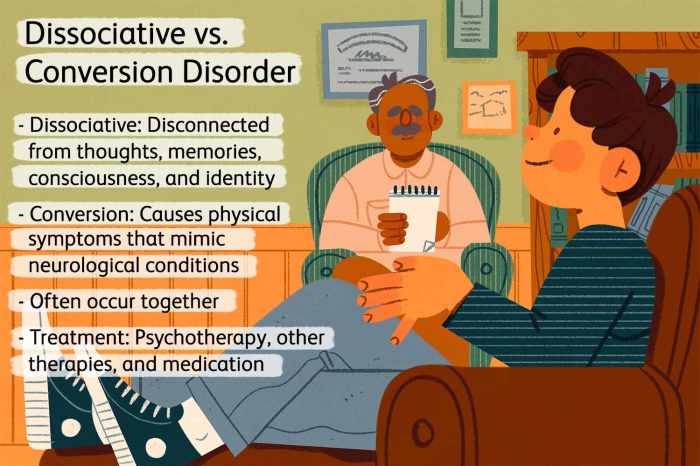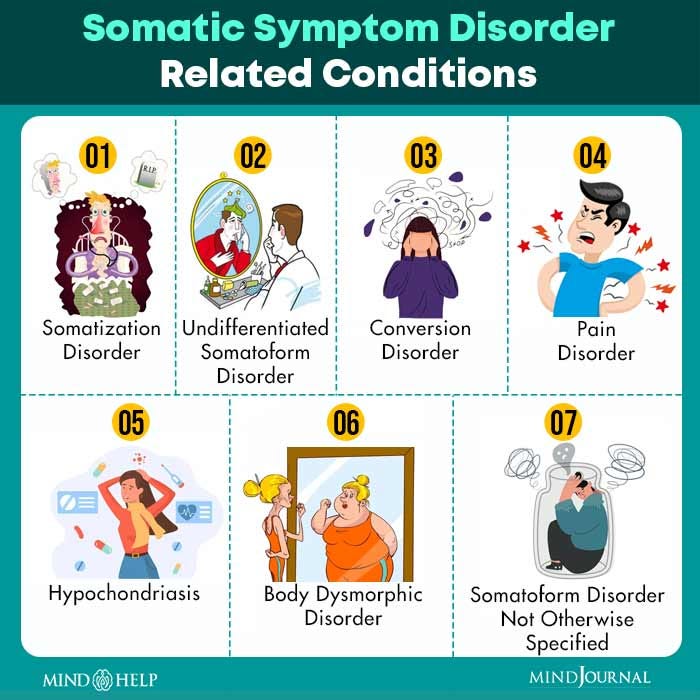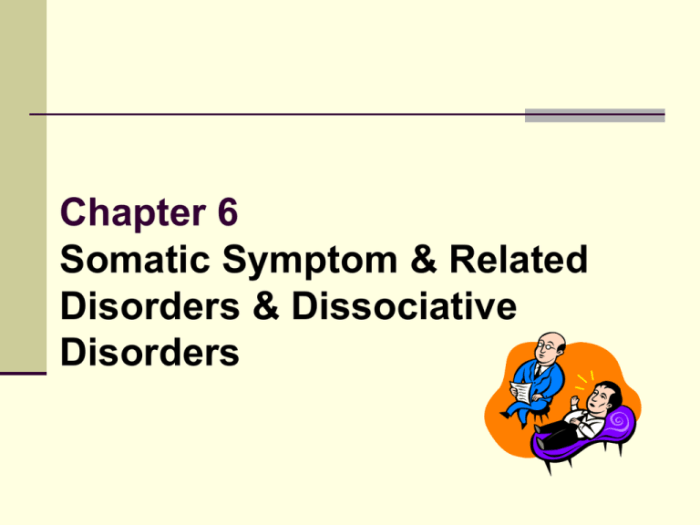Exploring the complexities of RN somatic symptom and dissociative disorders assessment, this comprehensive guide delves into the nuances of these conditions, providing a thorough understanding of their diagnosis, assessment, and treatment considerations. This authoritative analysis unveils the intricacies of these disorders, empowering healthcare professionals with the knowledge to effectively evaluate and manage these multifaceted conditions.
Somatic symptom disorders manifest as physical symptoms that lack a clear medical cause, while dissociative disorders involve disruptions in consciousness, memory, identity, or perception. Accurate diagnosis and assessment are crucial for guiding appropriate treatment interventions and improving patient outcomes.
Assessment of Somatic Symptom and Dissociative Disorders

Somatic symptom disorders and dissociative disorders are two distinct categories of mental health conditions characterized by physical and psychological symptoms, respectively. Accurate assessment is crucial for proper diagnosis and treatment.
Somatic symptom disorders involve excessive preoccupation with physical symptoms that cause significant distress and impair functioning. Dissociative disorders, on the other hand, are characterized by disruptions in memory, identity, or consciousness.
Differentiating between these disorders can be challenging due to overlapping symptoms. For instance, somatic symptom disorders may include psychological symptoms such as anxiety and depression, while dissociative disorders can manifest with physical complaints like pain or numbness.
Diagnostic Criteria for Somatic Symptom and Dissociative Disorders
The Diagnostic and Statistical Manual of Mental Disorders (DSM-5) provides specific criteria for diagnosing somatic symptom disorders and dissociative disorders.
Somatic Symptom Disorders
- One or more somatic symptoms that cause significant distress or impairment
- Excessive thoughts, feelings, or behaviors related to the symptoms
- Symptoms are not explained by another medical condition or substance use
Dissociative Disorders
- Disruption of memory, identity, or consciousness
- Symptoms cause significant distress or impairment
- Symptoms are not due to another medical condition, substance use, or cultural factors
Assessment Tools for Somatic Symptom and Dissociative Disorders, Rn somatic symptom and dissociative disorders assessment
Several assessment tools are available to aid in the diagnosis of somatic symptom and dissociative disorders.
Patient Health Questionnaire (PHQ-15)
The PHQ-15 is a 15-item questionnaire that screens for somatic symptoms. It assesses the frequency and severity of physical symptoms and the impact they have on daily functioning.
Dissociative Experiences Scale (DES)
The DES is a 28-item questionnaire that assesses dissociative experiences. It measures the frequency and severity of various dissociative symptoms, including depersonalization, derealization, and amnesia.
These assessment tools provide valuable information for clinicians in evaluating the presence and severity of somatic and dissociative symptoms.
Treatment Considerations for Somatic Symptom and Dissociative Disorders
Treatment for somatic symptom and dissociative disorders typically involves psychotherapy and, in some cases, medication.
Psychotherapy
- Cognitive-behavioral therapy (CBT): Focuses on identifying and changing negative thoughts and behaviors that contribute to somatic symptoms.
- Psychodynamic therapy: Explores unconscious conflicts and defense mechanisms that may underlie dissociative symptoms.
- Eye movement desensitization and reprocessing (EMDR): Uses eye movements to help process traumatic memories and reduce dissociative symptoms.
Medication
Medication may be used to manage co-occurring conditions such as anxiety, depression, or insomnia. However, there are no specific medications approved for the treatment of somatic symptom or dissociative disorders.
Quick FAQs: Rn Somatic Symptom And Dissociative Disorders Assessment
What are the key differences between somatic symptom disorders and dissociative disorders?
Somatic symptom disorders primarily involve physical symptoms without a clear medical cause, while dissociative disorders affect consciousness, memory, identity, or perception.
What are some examples of somatic symptoms?
Somatic symptoms may include pain, fatigue, gastrointestinal distress, or neurological complaints.
What is the Patient Health Questionnaire (PHQ-15) used for?
The PHQ-15 is a screening tool used to assess the severity of somatic symptoms.


